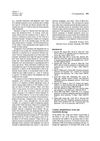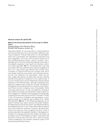 1 citations,
May 2015 in “Primary Health Care”
1 citations,
May 2015 in “Primary Health Care” Effective acne treatment varies by type, with topical and oral medications showing strong evidence, and patient education and support are crucial.
[object Object]  1 citations,
January 2014 in “Springer eBooks”
1 citations,
January 2014 in “Springer eBooks” Adult acne is more common in women, often linked to hormones, and can be harder to treat.
 1 citations,
July 2013 in “JAMA Dermatology”
1 citations,
July 2013 in “JAMA Dermatology” Dermatologists should address erectile dysfunction in patients with skin conditions to improve their quality of life.
 1 citations,
March 2011 in “Informa Healthcare eBooks”
1 citations,
March 2011 in “Informa Healthcare eBooks” Isotretinoin is a preferred treatment for severe acne, often leading to long-term improvement, but requires careful monitoring due to potential side effects.
 1 citations,
January 2010 in “Serbian Journal of Dermatology and Venereology”
1 citations,
January 2010 in “Serbian Journal of Dermatology and Venereology” The document concludes that effective acne treatment requires a personalized combination of therapies and long-term commitment, with retinoids being important for maintenance.
 1 citations,
November 2008 in “Gerontology”
1 citations,
November 2008 in “Gerontology” Older adults use lifestyle drugs to improve life quality and appearance, but caution is needed due to side effects and potential abuse.
1 citations,
March 1995 in “Pharmacoepidemiology and drug safety” Taking oral contraceptives while on isotretinoin may increase the risk of high triglyceride and cholesterol levels.
 1 citations,
November 1987 in “Journal of The American Academy of Dermatology”
1 citations,
November 1987 in “Journal of The American Academy of Dermatology” Isotretinoin can raise CPK levels, so patients need monitoring, especially before surgery.
 January 2025 in “Indian Dermatology Online Journal”
January 2025 in “Indian Dermatology Online Journal” Treatment reduced cystic lesions but didn't change existing Nevus Comedonicus.
 November 2024 in “Cureus”
November 2024 in “Cureus” Early diagnosis and personalized treatment can prevent damage from dissecting cellulitis after hair restoration surgery.

Biotin does not significantly help with hair growth.
 July 2024 in “JAAD Case Reports”
July 2024 in “JAAD Case Reports” Isotretinoin may effectively treat hereditary hypotrichosis simplex, a rare hair loss condition.
 May 2024 in “Aktualʹnì problemi sučasnoï medicini: Vìsnik Ukraïnsʹkoï medičnoï stomatologìčnoï akademì”
May 2024 in “Aktualʹnì problemi sučasnoï medicini: Vìsnik Ukraïnsʹkoï medičnoï stomatologìčnoï akademì” Spironolactone and clascoterone are promising acne treatments with fewer side effects.
 May 2024 in “Journal of Education, Health and Sport”
May 2024 in “Journal of Education, Health and Sport” Current treatments for folliculitis decalvans include antibiotics, isotretinoin, and potential new therapies like botulinum toxin A and PRP.
 April 2024 in “International journal of medical science and clinical research studies”
April 2024 in “International journal of medical science and clinical research studies” Effective acne management in PCOS includes hormone therapy, metformin, isotretinoin, weight loss, diet, exercise, and personalized treatment plans.
 March 2024 in “Journal of cosmetic dermatology”
March 2024 in “Journal of cosmetic dermatology” Isotretinoin can effectively reduce symptoms of frontal fibrosing alopecia.
 January 2024 in “Biological trace element research”
January 2024 in “Biological trace element research” Isotretinoin affects trace element levels and requires monitoring of liver and kidney functions.
 October 2023 in “Journal der Deutschen Dermatologischen Gesellschaft”
October 2023 in “Journal der Deutschen Dermatologischen Gesellschaft” Pregnancy can trigger severe rosacea, which may be treated with antibiotics and steroids, but there's no clear treatment guideline.
 September 2023 in “International Journal of Community Medicine and Public Health”
September 2023 in “International Journal of Community Medicine and Public Health” Different sebaceous gland diseases can be treated with medications, hormone therapy, or surgical methods.
 August 2023 in “Dermatology Reports”
August 2023 in “Dermatology Reports” Acne not improved by usual treatments may indicate a genetic disorder.
[object Object]  August 2023 in “Journal of The American Academy of Dermatology”
August 2023 in “Journal of The American Academy of Dermatology” Early treatment is key for permanent hair loss disorders, with options ranging from medications and phototherapy to immunomodulators and antibiotics, depending on severity and type.
 July 2023 in “Dermatology and Therapy”
July 2023 in “Dermatology and Therapy” 5-Alpha Reductase Inhibitors are effective for male hair loss and some skin conditions, but their effectiveness in women and safety concerns require careful use.

Older people tend to have higher biotin levels, which are weakly linked to certain blood components and negatively linked to triglycerides; biotin should be checked in patients with high triglycerides or medication-related skin issues, and only supplemented if deficient. Vitamin D and folate deficiencies are linked to specific skin conditions.
 June 2023 in “World Journal of Biology Pharmacy and Health Sciences”
June 2023 in “World Journal of Biology Pharmacy and Health Sciences” Acne is a common skin condition treated with creams, antibiotics, and emerging therapies, and it can significantly affect mental well-being.
 June 2023 in “British journal of dermatology/British journal of dermatology, Supplement”
June 2023 in “British journal of dermatology/British journal of dermatology, Supplement” The case suggests that dissecting cellulitis of the scalp can occur in a White child and should be considered when diagnosing pediatric scarring alopecia.
 April 2023 in “Journal of Investigative Dermatology”
April 2023 in “Journal of Investigative Dermatology” Acne patients have higher skin mTORC1 activity, which is reduced by isotretinoin treatment.
 January 2023 in “Side effects of drugs annual”
January 2023 in “Side effects of drugs annual” Some vitamins, amino acids, and alternative medicines can cause serious side effects, including bone, muscle, and skin issues, and healthcare professionals should be aware of these risks.
 January 2023 in “Indian dermatology online journal”
January 2023 in “Indian dermatology online journal” A boy with Pachyonychia congenita has a confirmed gene mutation, highlighting the need for a local genetic database in India.
 December 2022 in “Research Square (Research Square)”
December 2022 in “Research Square (Research Square)” Isotretinoin treatment increases p53 levels in the skin, which may explain its effectiveness against acne.
 November 2022 in “JAAD case reports”
November 2022 in “JAAD case reports” A man with skin and hair symptoms improved partially with specific treatment.





























